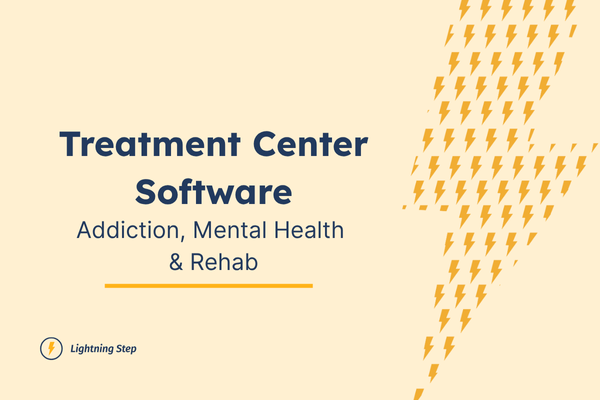
Manual processes and fragmented patient data create significant challenges for behavioral health providers. Staff spend countless hours on paperwork instead of patient care. Treatment plans get lost between departments. Billing errors delay revenue. Treatment center software offers a streamlined, tailored solution designed specifically for addiction recovery, mental health, and rehabilitation centers.
Managing patient intake, treatment plans, and regulatory requirements has become increasingly complex. Centers juggle multiple systems for scheduling, documentation, billing, and compliance reporting. This fragmentation leads to errors, delays, and frustrated staff.
Treatment center software differs from generic EMR/EHR platforms by addressing the specific needs of behavioral health providers. These specialized systems include addiction assessment tools, group therapy scheduling, and substance abuse billing codes that general healthcare software lacks.
Market demand for specialized solutions continues growing. Recovery and rehab centers recognize that one-size-fits-all software doesn't meet their requirements. They need platforms built for their workflows, regulations, and patient populations.
Intake and assessment tools come customized for addiction, mental health, and physical therapy programs. These include standardized screening instruments, risk assessments, and treatment readiness evaluations specific to each specialty.
Flexible treatment planning workflows support diverse therapy modalities. Staff can schedule individual sessions, group therapy, family counseling, and telehealth appointments from a single interface. The system tracks attendance, progress notes, and treatment goals across all modalities.
Integrated telemedicine, e-prescribing, and secure messaging enable remote care delivery. Patients access virtual sessions through patient portals. Clinicians prescribe medications electronically and communicate securely with patients between appointments.
Outcomes tracking dashboards provide real-time analytics and compliance reporting. Centers monitor patient progress, treatment completion rates, and readmission statistics. Automated reports help meet state and federal regulatory requirements.
Patient engagement improves through appointment reminders, mobile portals, and progress tracking. Automated notifications reduce no-shows. Patients view their treatment plans, medication lists, and upcoming appointments on their phones.
Data security strengthens with streamlined HIPAA compliance audits. Modern platforms include encryption, access controls, and audit trails built into the system. Compliance becomes automatic rather than manual.
Automated billing and claims management optimize revenue cycles for treatment services. The software handles complex billing scenarios like partial hospitalization programs, intensive outpatient treatment, and medication-assisted treatment. Claims submit faster with fewer denials.
Aggregated data provides actionable insights to refine treatment protocols and measure ROI. Centers identify which interventions work best for specific patient populations. They track financial performance and adjust operations accordingly.
Start by assessing your center's size, specialty focus, and growth trajectory. A small mental health clinic has different needs than a large addiction treatment facility. Consider your current patient volume and projected expansion plans.
Evaluate customization options, interoperability with existing systems, and scalability. The software should adapt to your workflows rather than forcing you to change established processes. Integration with labs, pharmacies, and insurance systems saves time and reduces errors.
User experience matters for adoption success. Look for intuitive interfaces, mobile access, and features that clinicians actually want to use. Complex systems that frustrate staff will fail regardless of their capabilities.
Analyze total cost of ownership beyond initial licensing fees. Factor in implementation costs, training expenses, ongoing support, and potential customization charges. Some vendors offer transparent pricing while others hide costs in contracts.
An addiction recovery center reduced administrative time by 40% after implementing specialized software. Staff automated intake processes, streamlined documentation, and eliminated duplicate data entry. Patient retention improved as counselors spent more time in direct care.
A mental health clinic boosted session attendance by 30% using automated reminder systems. The software sent text messages, emails, and phone calls based on patient preferences. Missed appointments dropped significantly, improving both patient outcomes and revenue.
A rehabilitation facility enhanced outcome tracking accuracy and optimized care plans through integrated analytics. Real-time dashboards helped clinicians identify patients at risk of dropout. Treatment teams adjusted interventions based on data rather than intuition.
Secure executive sponsorship and form a multidisciplinary project team. Include representatives from clinical staff, administration, IT, and billing. Leadership support helps overcome resistance to change.
Adopt a phased rollout approach. Start with core modules, gather user feedback, then expand functionality. This reduces disruption and allows staff to adapt gradually to new processes.
Invest in comprehensive staff training and ongoing support. Schedule multiple training sessions to accommodate different learning styles and schedules. Provide clear communication about why changes are happening and how they benefit both staff and patients.
Set key performance indicators and monitor adoption metrics. Track login rates, feature usage, and user satisfaction scores. Use this data to identify training gaps and workflow improvements.
Specialized treatment center software transforms operational efficiency and patient care by addressing the specific needs of behavioral health providers. Centers that implement these solutions see improved outcomes, reduced costs, and higher staff satisfaction.
Emerging innovations include AI-driven treatment recommendations, predictive analytics for relapse prevention, and integrated care ecosystems connecting multiple providers. These advances will further improve treatment effectiveness and operational efficiency.
Evaluate your center's current challenges and research vendors that specialize in your treatment population. Schedule demos to see how modern platforms can transform your operations and improve patient outcomes. The investment in specialized software pays dividends through better care delivery and financial performance.



